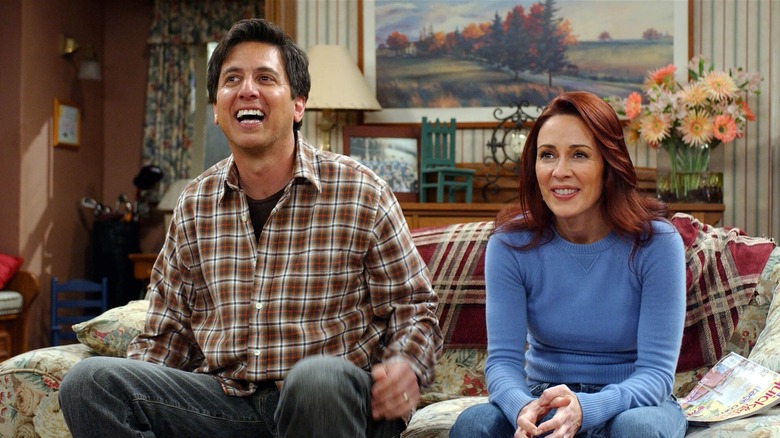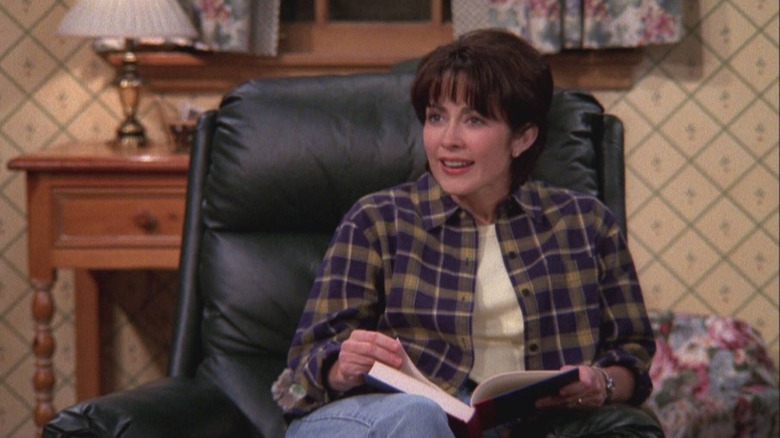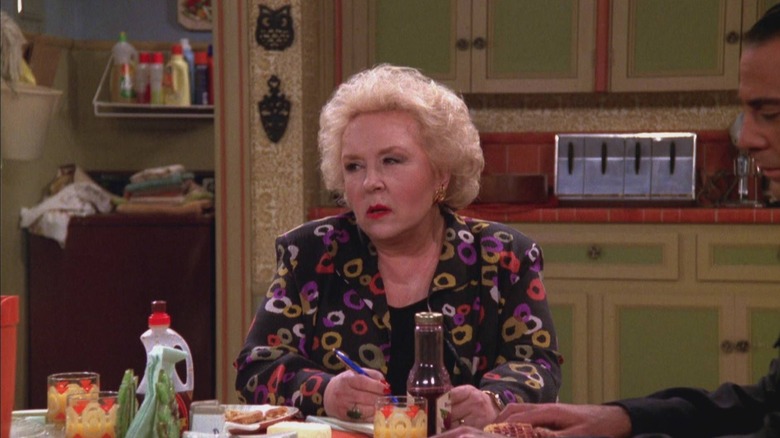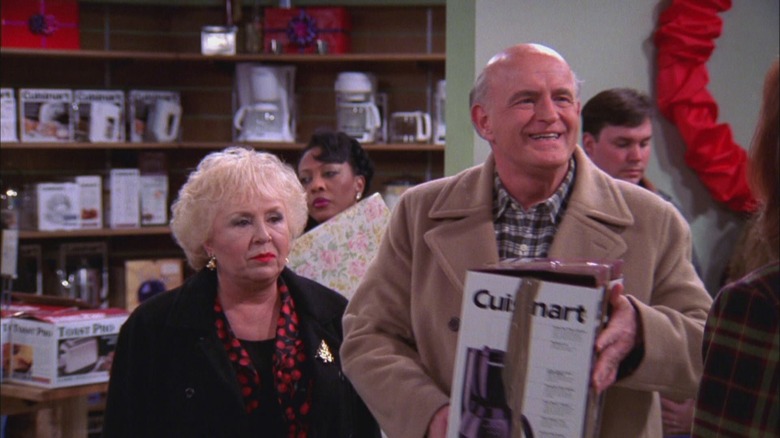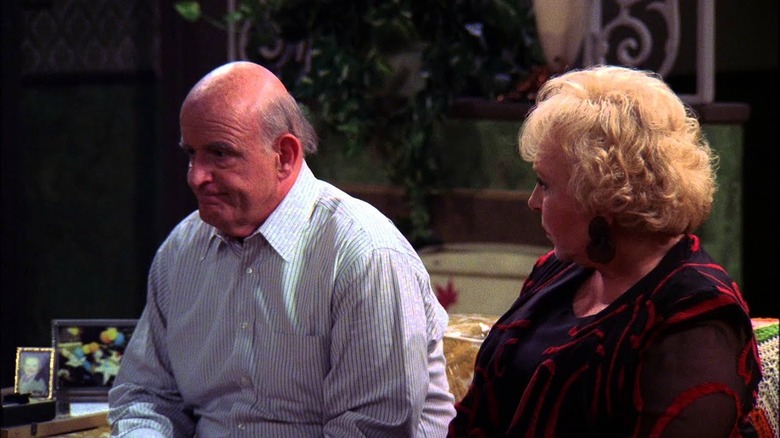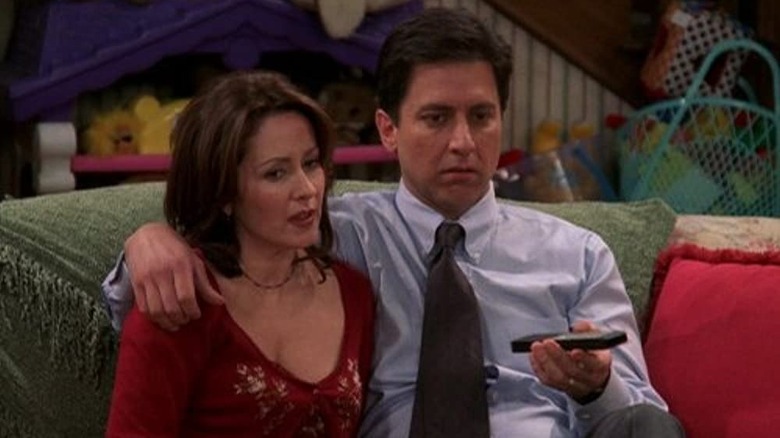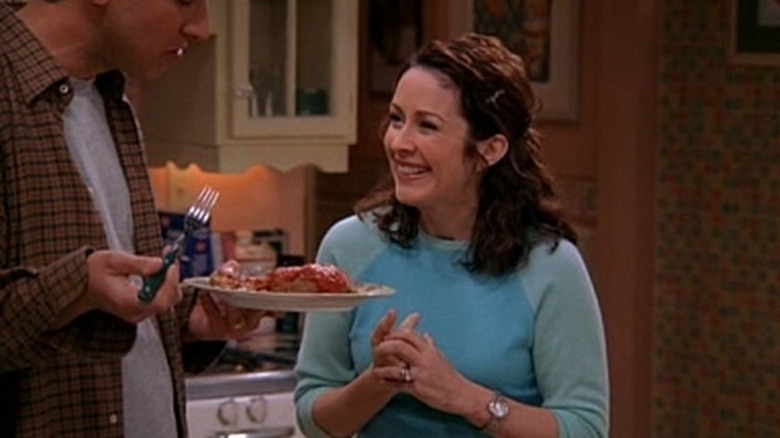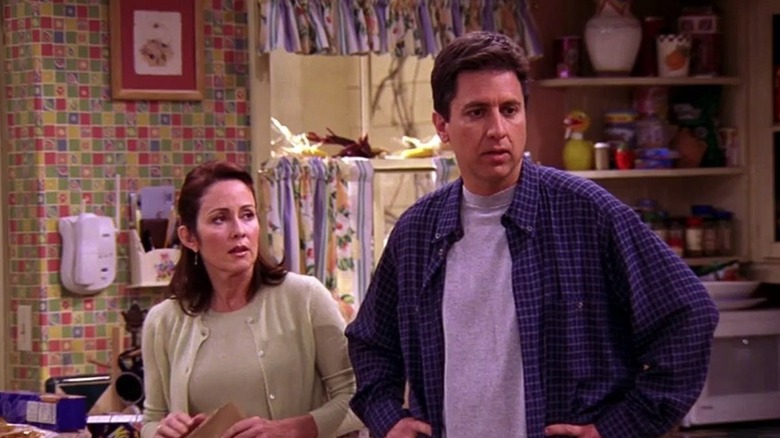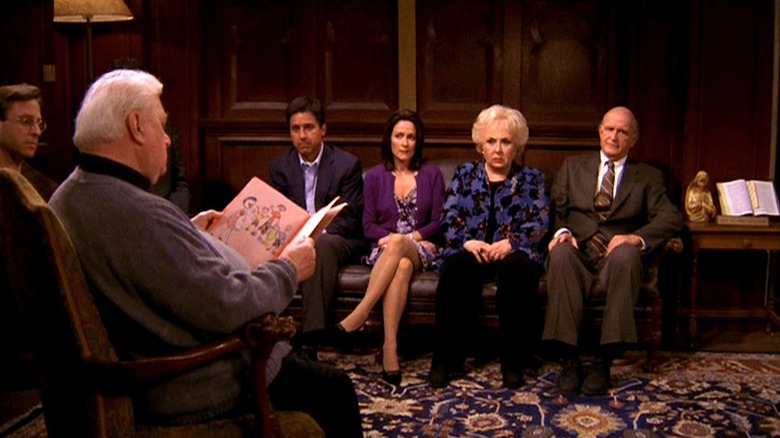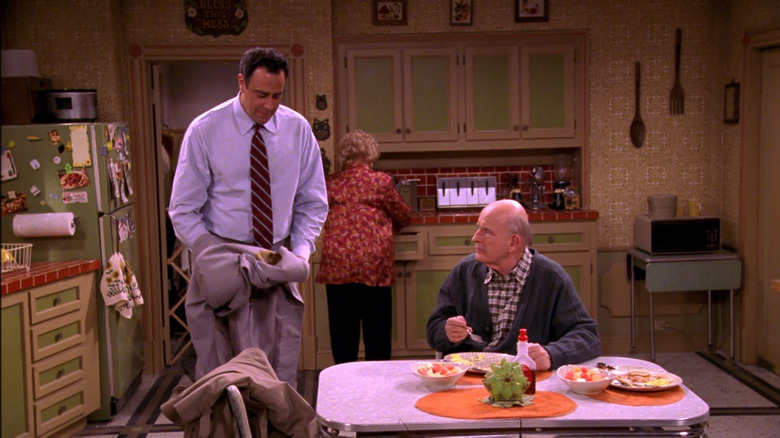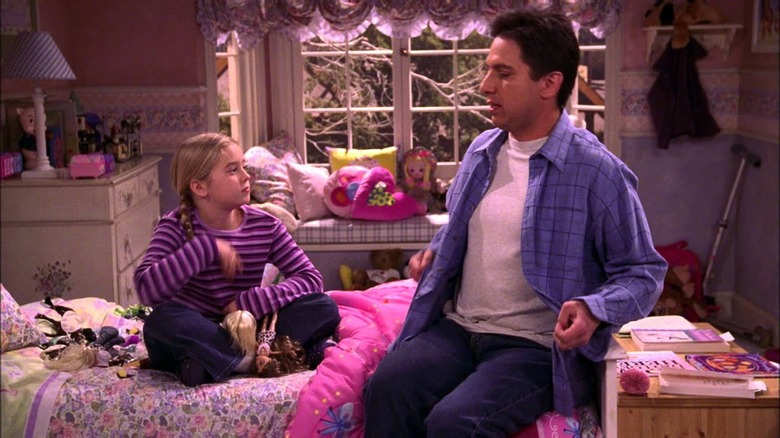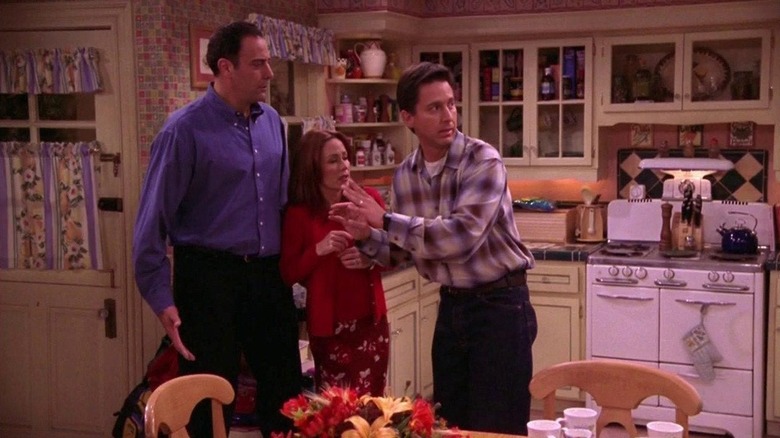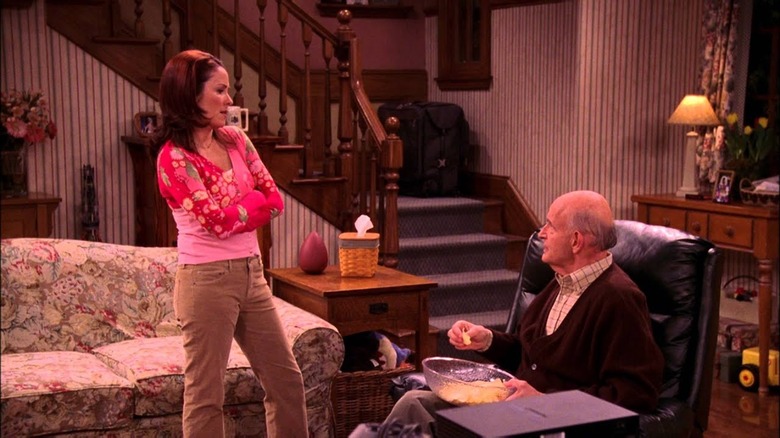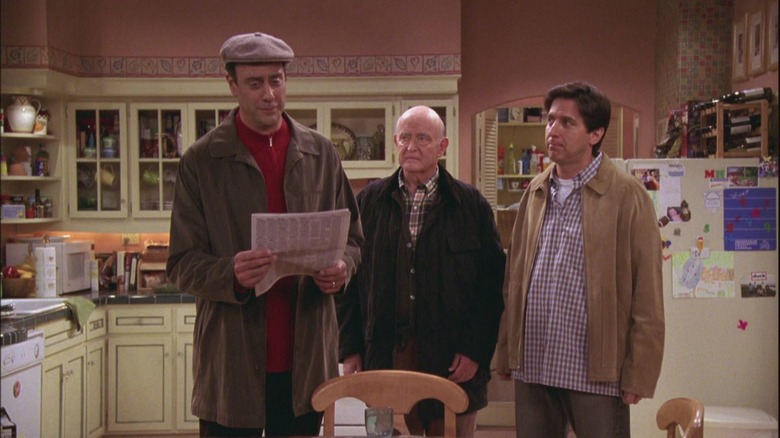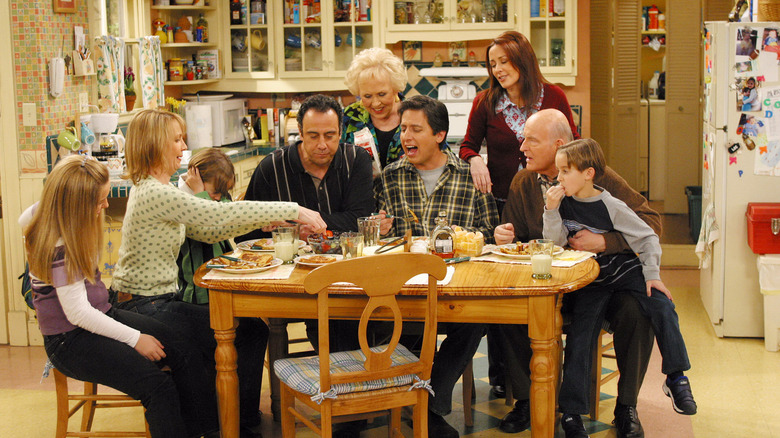The Best Episodes Of Everybody Loves Raymond
In 1996, comedian Ray Romano partnered with writer and producer Phil Rosenthal to develop a sitcom based on Romano's comedy. The result was one of the greatest TV comedies not just of the 1990s, but of all time.
The story of sportswriter Ray Barone (Romano), his put-upon wife Debra (Patricia Heaton), his overbearing mother Marie (Doris Roberts), wise-cracking father Frank (Peter Boyle), and brother Robert (Brad Garrett), the series followed the life of the Barone family in their Long Island neighborhood as the grappled with everything from marital strife to parenting woes to the joys and challenges of having your parents living right across the street.
Over the course of nine years on the air, "Everybody Loves Raymond" released more than 200 episodes, became a ratings hit, won 15 Emmy Awards (including two for Outstanding Comedy Series), and has since became a syndication phenomenon. It seems like "Raymond" is always on somewhere, and there are dozens of great episodes — but what are the ones you need to watch if you want the very best? That's why we're here. From Ray and Debra's household battles to Robert's love life, these are the best episodes of "Everybody Loves Raymond."
Standard Deviation (Season 1, Episode 4)
Though the first three episodes of "Everybody Loves Raymond" definitely served to help set the show's tone, it wasn't until the fourth episode that the series really came into its own in terms of the kinds of comedic conflicts it would become best known for in the coming years.
In "Standard Deviation," Robert asks Ray and Debra if they will submit to an IQ test for a project he's undertaking at work. Both agree, only to find the results definitively prove that Ray is not as smart as his wife.
The rest of the episode is the kind of intricate psychological dance that made "Raymond" so funny, as we get to watch Debra celebrate her own proof that she's smarter than her husband while also watching Ray realize that he can use his status as the dumb one to his advantage. It all culminates in one of the best twists in the show's history, as Robert reveals the project was actually more about psychology and conflict than it was about intelligence, and by the time the credits roll the show emerges as a fully formed version of what made it a hit. Plus, Debra slapping a bowl of ice cream down into Ray's lap is one of the all-time funniest moments in the series.
The Letter (Season 2, Episode 11)
One of the backbones of the comedy, and sometimes the drama, of "Everybody Loves Raymond" is the relationship between Debra and her overbearing mother-in-law, Marie. Dozens of episodes over the course of the show's run explore their conflict and the highs and lows of their lives together, but one of the best came very early in "Raymond" history.
In "The Letter," Debra decides to break out a nuclear option after Marie shows up unexpectedly at a party she's throwing for her friends and butt in, ruining the event in the process. Debra is so overcome with rage that she decides to write Marie a letter telling her exactly what she thinks of her. The rest of the episode deals with the fallout, as Ray reacts to his wife actually sending the letter and Marie decides to respond with a little writing of her own.
This episode ranks among the show's best for a number of reasons, not least of which is its ability to wrench surprising heart and vulnerability out of what's ultimately the story of two women trading insults. No matter how heated "Raymond" got, it always came back to love, and this is the one of the best examples of that.
The Toaster (Season 3, Episode 12)
The exploration of family dynamics and conflicts in "Everybody Loves Raymond" was often particularly sharp in its holiday episodes, which dealt with everything from accidentally giving out condoms on Halloween to a tofu turkey for Thanksgiving. Of all the show's holiday episodes, though, Season 3's Christmas episode stands as the best.
"The Toaster" is named for a somewhat quirky Christmas gift idea Ray decides to put in motion during this holiday season. With Debra's blessing, he has several toasters engraved "Merry Christmas, We Love You," followed by the names of his whole household. Debra's parents love the thoughtfulness and out of the box thinking behind the gift, and so does his brother Robert. Ray's parents, on the other hand...
The episode really starts to pick up steam when Ray realizes his parents not only didn't open the toaster to see the engraving, but returned it in order to get a new coffee maker. It takes on another level, though, when Frank and Marie decide they have to get their toaster back, making for a classic holiday episode that remains one of sitcom history's best Christmas laughs.
Frank's Tribute (Season 3, Episode 16)
"Everybody Loves Raymond" work so well in part because its characters were designed to be relatable representations of every American family — while also verging into near-cartoonish territory whenever the show's premises called for it. There's perhaps no better example of this than Frank Barone, Peter Boyle's gruff, wise-cracking father who'd rather sit in front of the TV and eat than do pretty much anything else.
Frank's persona was already pretty well-defined by the time the character made it to the show's third season, but "Frank's Tribute" forever cemented exactly the kind of guy he was. In the episode, Ray and Robert are tasked with collecting video testimonials about their father for an award he's about to receive ... but when they go to Frank's lodge to ask his "friends" to talk about him, they find that no one actually has anything nice to say. Their fix, and Frank's response to it, is hilarious — but by the end of the episode "Frank's Tribute" also betrays a certain tenderness, revealing a depth to Frank that ends up making all the over-the-top reactions that much more resonant.
The Tenth Anniversary (Season 4, Episode 16)
For all his faults, Ray Barone tries. It's one of the key forces at work in the show, that Ray genuinely does care what his wife thinks of him. For all of his bumbling, he does manage to put in effort in the end, even if he's sometimes way, way too late. That's a big part of the setup behind "The Tenth Anniversary," one of the most memorable episodes of the show, and a testament to how deep Ray is willing to go when he realizes he's made a huge mistake.
The catalyst for the episode is very simple: It's Debra and Ray's tenth wedding anniversary, and she wants to watch their wedding video. There's just one problem: Ray accidentally taped over it with a particularly memorable Super Bowl. Debra's reaction is swift and predictable, but Ray has a solution: Why not throw a vow renewal ceremony to make up for it? What happens next is emblematic of the kind of sweet and sour blend that made "Everybody Loves Raymond" such a hit for so many years. While there were certainly bigger episodes of the show, "The Tenth Anniversary" remains one of the great events of the entire run.
Debra Makes Something Good (Season 4, Episode 18)
One of the most famous running jokes on "Everybody Loves Raymond" is the fact that Debra can't really cook. When she does cook, she seems to always make only one thing — lemon chicken — and when she tries to get adventurous with food it's usually met with skepticism and more than a few barbs thrown by Marie. So naturally, when she finally figures out how to make something else that tastes good, it throws the whole family into disarray.
The "something" in "Debra Makes Something Good" is braciole, an Italian stuffed beef dish that all the Barone men quickly go crazy for. Marie is, of course, unhappy with this. What throws things even more out of whack is what happens when Debra finds out that Ray is still making jokes about her cooking at work, despite her newfound gift for braciole. Throw in Frank's sudden obsession with his daughter-in-law's kitchen, and you've got one of the show's most well-constructed instant classics.
Wallpaper (Season 5, Episode 3)
If you've never seen a single episode of "Everybody Loves Raymond," you at least probably know the setup of the core conflict of the entire show: His parents live across the street, and that's not always fun. It's a layer of tension that appears in some form in almost every episode of the show, and one of the keys to its success is the ways in which the series' writers are able to pull it back and/or throttle it up at will. Then there's the one episode where they put the throttle all the way up.
"Wallpaper" is one of the most famous "Raymond" episodes because it's one of the most elaborate, in that it involved driving a car right through the show's main set. The episode begins with Frank and Marie (who's driving) accidentally backing their sedan right through Ray and Debra's front door. It spirals out from there as Ray realizes that not only did his parents crash through his house, but they forever messed up the symmetry of his wallpaper. It's a rare episode where Ray, not Debra, gets to be the one to lose it on his parents, and it remains an unforgettable installment.
The Angry Family (Season 6, Episode 1)
There's a lot of yelling in "Everybody Loves Raymond." Ray yells at Debra, Robert yells at Ray, Frank yells at Marie, and on some occasions everyone yells at each other. The writers were always able to insert an element of relatability into each of the key fights, then cap them off with expressions of love. Nowhere is that better exemplified than in the Season 6 premiere, "The Angry Family."
The episode begins with the family gathered at school to watch one of Ray and Debra's son read a story he wrote for his class. When they realize the story is called "The Angry Family," and it's about a group of adults who never stop yelling at each other, the whole Barone crew is mortified. What follows is a half-hour of serious self-examination that culminates in a meeting with a priest and a family counselor, as the Barone adults try to reckon with what exactly made the kid write that story in the first place. It's "Raymond" at its most meta-textual, as the characters themselves pick apart the entire dynamic of the show, and it's great fun to watch.
Lucky Suit (Season 6, Episode 16)
The show is called "Everybody Loves Raymond," so it makes sense that most of the episodes center in some way on Ray and his household. Every once in a while, though, we get an episode that focuses more on Robert Barone and his journey from sad divorcee to eligible bachelor to husband once again. Of these, one of the most memorable is "Lucky Suit."
After years of work at the NYPD, Robert gets an opportunity to interview for a job at the FBI, and asks his mother to prepare his beloved lucky suit for the meeting. When Marie presents him with the suit, Robert learns that she accidentally left a huge scorch mark on it, creating a domino effect as Marie keeps trying to fix her mistake in increasingly invasive ways. It's all very funny, and it gives Brad Garrett lots of opportunity to push Robert's comedic temper to its limit — but there's also a layer of deep emotion to it as we learn exactly what went wrong with the suit, and exactly what's going through Marie's head. This is one of the most essential Robert episodes.
Talk to Your Daughter (Season 6, Episode 19)
One of Ray's defining personality traits is his discomfort with certain kinds of intimacy, something that creates friction with Debra. While his wife is very in touch with her feelings, Ray struggles to access certain areas of his emotions, thanks in part to his upbringing. Still, sometimes he's determined to break through that barrier, with hilarious consequences.
In "Talk to Your Daughter," Ray decides he will prove to Debra that he's a mature adult by talking to their daughter Ally (Madylin Sweeten) about the birds and the bees. When Ray gets into the room for The Talk, though, he finds that Ally isn't asking how babies are made, but why babies exist in the first place. His daughter's question about the meaning of life itself throws Ray for a loop, which then extends to the entire Barone family, as the adults are left reeling from this single simple question. It's one of the more philosophically daring "Raymond" episodes, and yet it never stops being completely relatable.
She's the One (Season 7, Episode 9)
Robert is divorced when we first meet him, and spends nearly the entire run of the show trying to decide what he wants out of his romantic future. Sometimes he's playing the field, sometimes he's getting experimental with his dates, and sometimes he's on-again-off-again with his eventual wife Amy (Monica Horan) — but wherever he is, it's always hilarious. When it comes to Robert's dating life, though, one episode stands above the rest.
In "She's the One," Robert brings a woman over to Ray and Debra's house for dinner, having already told them that he's pretty sure he might have found the woman of his dreams. His date is smart, funny, and beautiful, but there's just one problem: When she thinks no one else is looking, she picks up a dead fly and eats it. Ray, the only witness to this bizarre act, tries to warn his brother, and sets off a chain of events that still ranks among the funniest in "Everybody Loves Raymond" history.
Baggage (Season 7, Episode 22)
Because so much of "Everybody Loves Raymond" centers on the ins and outs of married life, some of the best episodes in the show's history are focused on very simple premises that allows Ray Romano and Patricia Heaton to just go at each other for half an hour. There are quite a few such episodes, but the best might be "Baggage."
The setup is extremely straightforward. Ray and Debra come home from a family trip and Ray sets a big suitcase full of dirty clothes on the stair landing right next to the living room. Then it sits there, and sits there, and sits there, because neither Ray nor Debra thinks that they should be the one to move it, and neither of them is willing to back down in the face of the other's pressure. So, with input from both Frank and Marie, the couple engages in a full-on battle of wills over a single suitcase. It's one of the best episodes of pure marriage pettiness in a show full of them.
Boys' Therapy (Season 9, Episode 6)
Even after eight full seasons of sitcom TV, the writers of "Everybody Loves Raymond" never stopped finding ways to challenge their characters while still keeping audiences laughing. "Boys' Therapy" is one of the best examples of the show's latter-day brilliance.
When Debra and Marie find out that Robert has begun going to therapy, they pressure Ray and Frank to go along with him in the hope that they might reach some level of personal growth. Instead, Ray and Frank convince Robert to go to the dog track instead and simply pretend they went to therapy. Then, something amazing happens.
In the midst of his classic sitcom plot of triple marital deception, as they try to come up with various therapeutic buzzwords and conclusion they can take back home to their wives, Ray, Robert, and Frank start to have genuine breakthroughs. They start to realize things about themselves they never considered before, setting the stage for moments of genuine emotional insight. It's a funny episode, but it's also one of the show's best examples of sneaking real heart in among the laughter.
The Finale (Season 9, Episode 16)
With a couple of exceptions, "Everybody Loves Raymond" was a thoroughly episodic show, meaning you could dip into any episode at any time and enjoy it. There were no major dangling storylines to wrap up as the series came to an end after nine seasons, which meant the writers had to craft a satisfying conclusion without drawing from a larger plot.
What they eventually landed on for "The Finale" is a pitch-perfect farewell that blends the heart and humor of the series with a certain momentary sense of danger. The episode follows the family as Ray is set to have a minor surgical procedure, then reveals what happens when, for just a moment, something goes very wrong. In the split second when it seems like Ray might not wake up, every member of the Barone clan has something different to say and do about it, and that gives each of them a final word in the series on how they feel about Ray, and each other. It's a poignant goodbye that also packs a feather-light touch.
